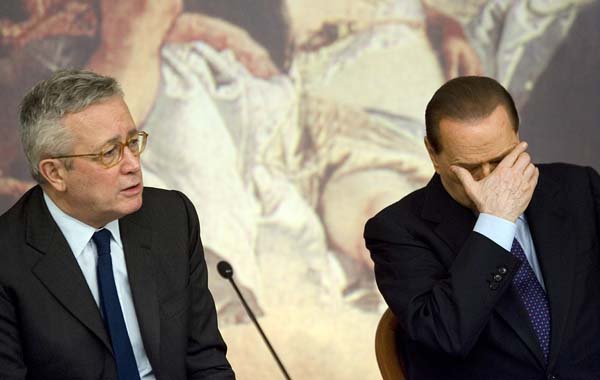ROME — Italian Prime Minister Silvio Berlusconi on Wednesday announced $29.3 billion in spending cuts just weeks after ruling out similar measures to handle Italy’s debt load.
The cuts may not be enough to keep markets soothed - and keep Italy from falling victim to Europe’s government debt crisis - if the government doesn’t make deeper structural changes that stimulate growth, analysts said.
Berlusconi and his top aides until recently insisted that Italy would be able to avoid a crisis without sacrifices. But the government reversed course this week - emphasizing cuts to the overblown, stodgy bureaucracy and pledging to fight tax evasion, a major drain on state coffers.
Berlusconi and Finance Minister Giulio Tremonti outlined the measures in a news conference late Wednesday. Parliament’s approval is needed.
The measures would trim Italy’s deficit from 5.3 percent of economic output in 2009 to 2.7 percent in 2012 and reassure investors that Italy can handle its heavy debt load, which tops 118.8 percent of gross domestic product.
Italy’s debt is the highest in the eurozone, twice the limit of 60 percent imposed by EU rules, which have not been strictly enforced. But so far it has largely been spared the troubles of other heavily indebted countries such as Greece, Spain and Portugal, which have seen borrowing costs rise because of fears of default. Greece was shut out of borrowing markets and needed a bailout to avoid bankruptcy.
Italian stocks rose Wednesday, with the benchmark index up 2.2 percent on the day, mirroring an upward sweep of European indexes regaining some of this week’s losses.
European Union leaders responded to the spiraling debt crisis with a $1 trillion loan backstop for struggling governments. But it buoyed the markets for only days, and continuing fears of a wider debt crisis forced Italy’s hand to join Spain, Portugal, Greece and Ireland in announcing cutbacks aimed at supporting market confidence.
Governments are seeking to boost investor confidence in their sovereign debt to keep the price of borrowing low, and avoid being pushed to near default like Greece. They also want to support the euro, trading Wednesday as low as $1.22, down from $1.51 late last year.
“It is very difficult to stop the slide until they can convince people that they can turn the economies on Europe’s periphery to growth,” said Barcelona-based independent economist Edward Hugh.
IHS Global Insight analyst Raj Badiani called the Italian measures “an encouraging first step.”
Greece is considering privatizing state assets to chip away at the debt that brought it close to bankruptcy, with the prime minister and his Cabinet also looking for ways to boost competitiveness at a meeting Wednesday.
Faced with a bloated budget deficit and mounting public debt, the Greek government has cut pensions and salaries, raised consumer taxes and cracked down on tax evasion. Many of the harsh austerity measures were taken in order to qualify for a $134 billion rescue package of loans from other countries that use the euro and from the International Monetary Fund.
The government has emphasized its crackdown on tax evasion, with the finance ministry saying late Tuesday that it had started an investigation of tax and customs officials after receiving a string of complaints over alleged bribery, forgery and smuggling.
The ministry said it had even located 234 finance ministry employees who failed to file income tax declarations in 2007 and 2008.
Spain will introduce a new tax for the country’s highest income earners in the next few weeks, part of a wider effort to raise money and cut a swollen deficit, Prime Minister Jose Luis Rodriguez Zapatero said Wednesday.
Zapatero said the tax “will not affect 99.9 percent of Spaniards” but he gave no more details.
His socialist government recently approved public sector wage cuts and other spending reductions to save $18.33 billion this year and next to reduce Spain’s deficit and calm jittery markets.
The prime minister has said his salary and those of other senior members of the government will be cut by 15 percent.
On Tuesday, lawmakers in both chambers of Parliament agreed to cut their base salaries by 10 percent. Municipal governments announced pay cuts of as much as 15 percent for mayors and other elected officials.
The cutback package is expected to be approved by Parliament today.
Zapatero first mentioned the new tax for the high-wage earners last week to stave off criticism that low-income earners were being targeted by the cutbacks, but he has so far failed to give any specifics beyond saying it will be a temporary measure.
Spain is under pressure to introduce labor market, fiscal and banking changes to cut its deficit from 11.2 percent of gross domestic product in 2009 to within the EU limit of 3 percent by 2013.
Europe’s top job creator two years ago, Spain now has the region’s highest unemployment rate at just over 20 percent and is the slowest of the major economies to emerge from the recession.
Information for this article was contributed by Colleen Barry, Francis D’Emilio and Ciaran Giles of The Associated Press.
Business, Pages 25 on 05/27/2010

